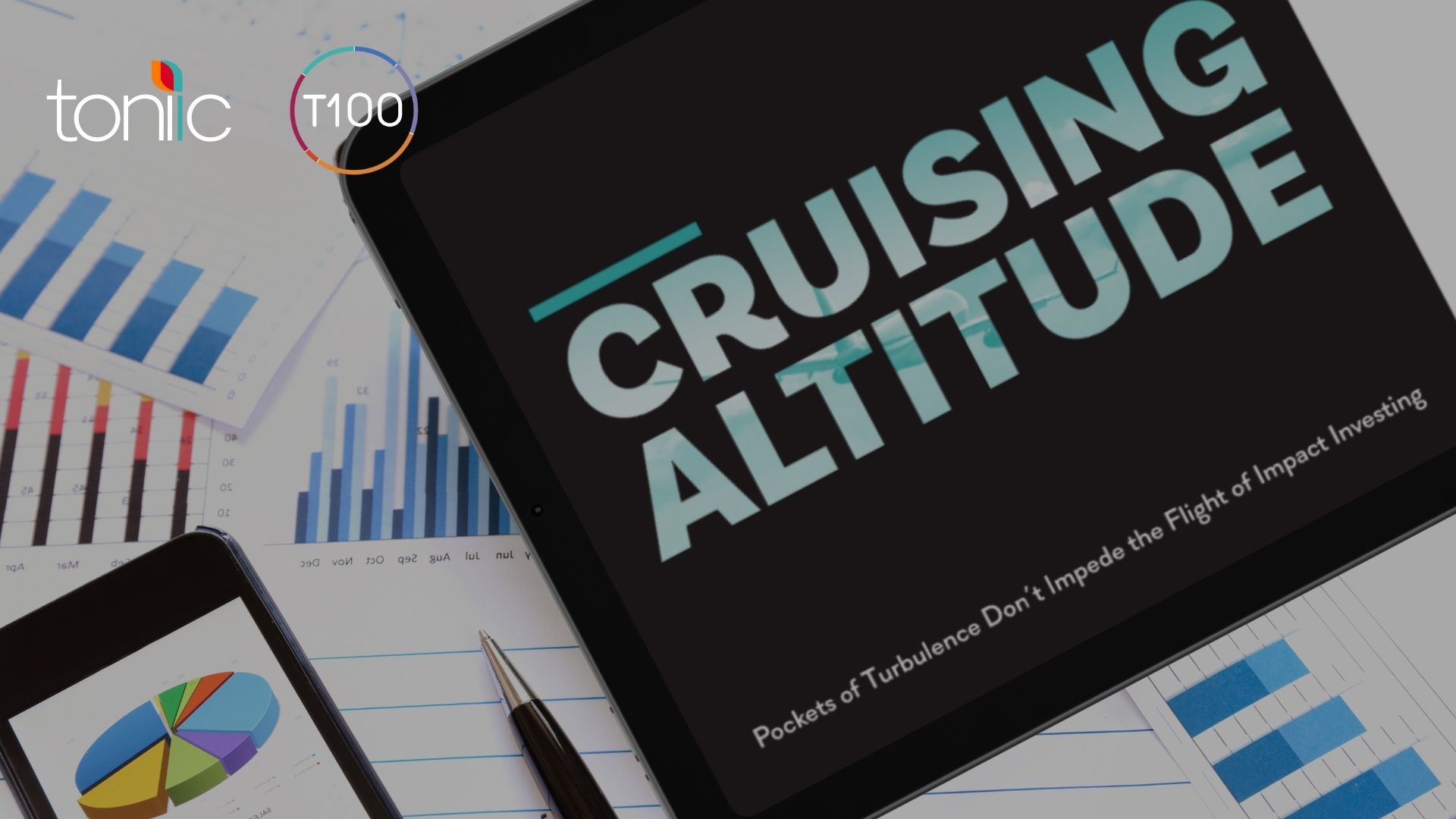Toniic’s latest T100 report shows remarkable shifts in impact capital deployment over the last ten years
NEW YORK and LONDON, April 14, 2025
Toniic today released “Cruising Altitude,” the latest comprehensive report in its longitudinal study of the portfolios of active private wealth impact investors, dubbed the “T100 Project.” For the past nine years, the T100 Project has collected private data and published a series of reports anonymizing and aggregating that data, enabling a unique perspective on trends in the investing habits of wealthy individuals, family offices and charitable foundations who are focused on positively impactful investing.
“The latest report shows some positive trends, and new investment opportunities” says Dara Parker, Toniic CEO.
Investments supporting clean energy and climate action have become by far the most invested thematic area, followed by decent work and economic growth.
Impact investors are targeting impact in every asset class, not just in private debt and equity. Nevertheless, the data show a clear inverse relationship between enterprise impact and liquidity, demonstrating a willingness to allocate capital to illiquid investments to achieve positive impact.
A notable trend across regions is a home-region bias, with investors favouring enterprises within their geographic areas. Despite this, impact remains the driving force behind investment decisions. More than half of the capital in these diversified portfolios is directed toward enterprises that “contribute to solutions”—the highest expression of enterprise impact. Furthermore, over half of all invested capital is allocated using an investor contribution strategy, whether by growing new or undersupplied capital markets, engaging with enterprises to enhance their impact, or providing catalytic capital.
These investors are laser focused on causing something good to happen with their investment capital that otherwise would not. Collectively, catalytic capital represents 19% of the $3.5B of investments in the T100 portfolios. Impact potential is increasingly driving asset allocation decisions among impact investors rather than conventional investment criteria alone.
“The correlation between impact and illiquidity is underappreciated,” says Adam Bendell, Toniic President. “Impact investors are more willing to trade liquidity for impact than they are to trade risk-adjusted returns. Even so, we were surprised by the extent of catalytic capital investment. Despite the current political headlines, this field is neither dead nor dying.”
The study includes family offices, charitable foundations and High Net Wealth individuals committed to fully investing their portfolios for social and environmental impact. The T100 Project is the first publicly available study to deliver detailed insights into the portfolios of such a large group of private impact investors.
Key Findings:
- Increased allocations toward impact: The data shows a trend of increasing allocations to investments where the investor takes an active role in contributing to the impact of the investment. There has been a marked increase in these types of investments and a decrease in those considered potentially harmful.
- Product Gaps and Market Opportunities: The study highlights several market gaps ripe for innovation:
- Cash alternatives: Cash remains the most challenging asset class for impact, with 58% of investments classified as “does/may cause harm.” Despite the emergence of community development financial institutions and sustainable banks, the operational sophistication of major banks continues to trump impact considerations.
- Underserved SDGs: Water and sanitation (SDG 6) and peace, justice, and strong institutions (SDG 16) show minimal investment despite significant need. The UN Conference on Trade and Development identifies a $2 trillion investment gap in water and sanitation, suggesting a massive opportunity for product development.
- Public market products: While public equities make up a significant portion of portfolios, investors struggle to find products that truly “contribute to solutions” in this asset class.
- Market Evolution: The T100 data shows a market in transition. Impact investors have become more sophisticated in their approach, moving beyond simple screening to embrace more nuanced strategies for contribution. Increased deployment of catalytic capital suggests a growing recognition that different forms of capital are needed to address different challenges.
Implications for the Field
“The latest data shows clear signals for financial product developers, fund managers, wealth managers, advisors and the field at large,” says Adam Bendell, Toniic President.
For product developers and fund managers, the findings provide clear signals about market demand. The strong appetite for private market investments that contribute to solutions, combined with the willingness of investors to accept illiquidity for impact, suggests continued opportunity in this space.
For wealth managers and advisors, the data highlights the need to develop more sophisticated approaches to portfolio construction that can accommodate varying levels of return expectations and impact strategies within a single portfolio.
For the broader impact investing field, the report demonstrates that the market has moved well beyond the question of whether impact investing is viable across a portfolio. The new frontier is how to optimize the deployment of different forms of capital – from market rate to catalytic – to maximize both financial returns and impact contribution.
The T100 Project’s findings suggest we’re entering a new phase of market maturity. The challenge ahead lies not in proving the concept, but in scaling solutions to match the magnitude of global challenges while maintaining the integrity of impact measurement and contribution.
These findings occur at a time when Morningstar reports ~20B withdrawal from sustainable funds in 2024; the T100 Project demonstrates that impact investors such as HNIs, family offices, and foundations show a sustained demand for products and commitment to deploying private capital for impact.
About the T100 Project
The T100 Project is Toniic’s longitudinal study of the practices and portfolios of committed impact investors since 2016. Now containing data from more than 100 distinct portfolios, the project studies how these investors deploy capital to achieve both financial return and net positive social and environmental impact. Access our latest report here: Cruising Altitude

